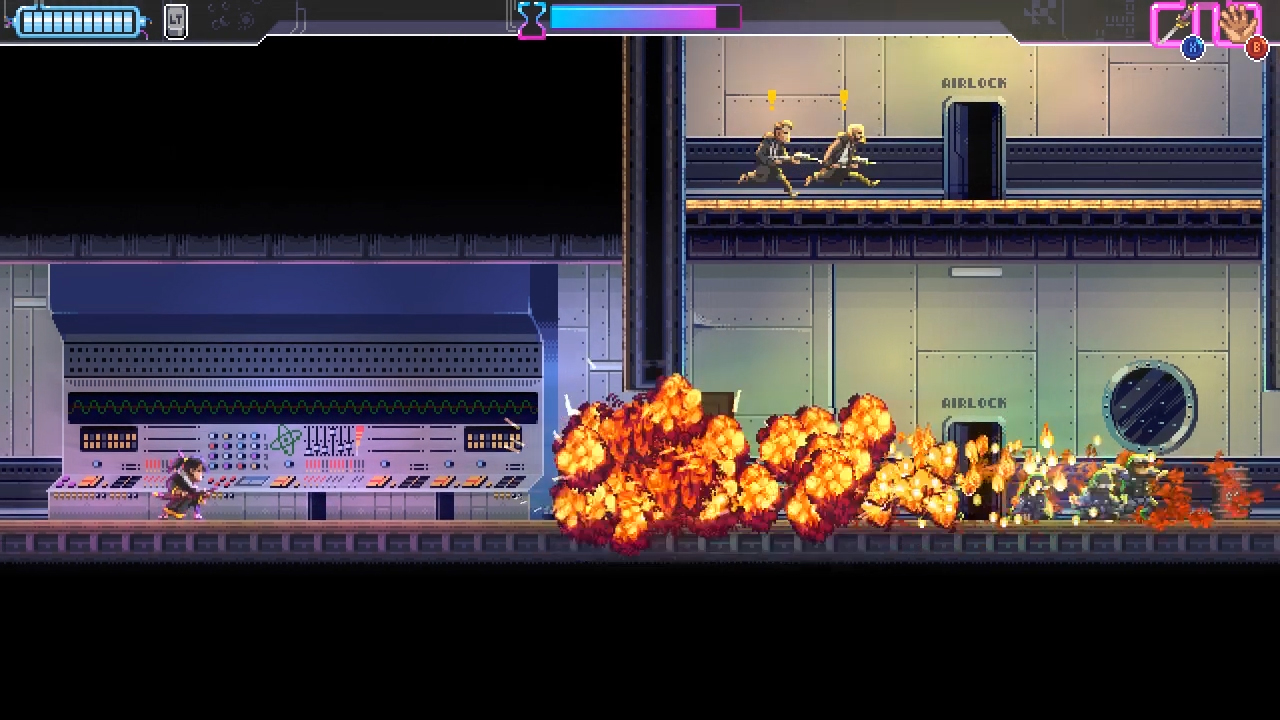Our Verdict
Thoughtfully-designed levels and versatile combat abilities make Katana Zero worthy of a rewind despite cookie-cutter characters.
PC Gamer's got your back
What is it? A strategic action slash-em-up with visual novel bookends
Reviewed on: Windows 10, intel i7 8700k, 16GB RAM, NVIDIA GeForce GTX 970.
Price: $15/£12
Release date: Out Now
Publisher: Devolver Digital
Developer: Askiisoft
Multiplayer: Singleplayer
Link: Official site
I typically avoid games that cause me to swear and sweat through my own repetitive, frustrating failures. For Katana Zero, I consider the stress worth it.
In the prison escape level, for example, I die countless times attempting to fulfill my orders (I refuse to watch my footage to count them). I'm supposed to avoid detection and not go on a killing spree, and when I finally succeed at it, it's partly luck. I'm not convinced that my slow-motion somersault over the head of a guard is what the developer had in mind when designing that level, but I get a rush of adrenaline anyway when I realize that it's worked.
Like Hotline Miami and other action puzzlers, Katana Zero's sidescrolling levels are tightly designed with multiple possible ways to hack and slash my way through them.
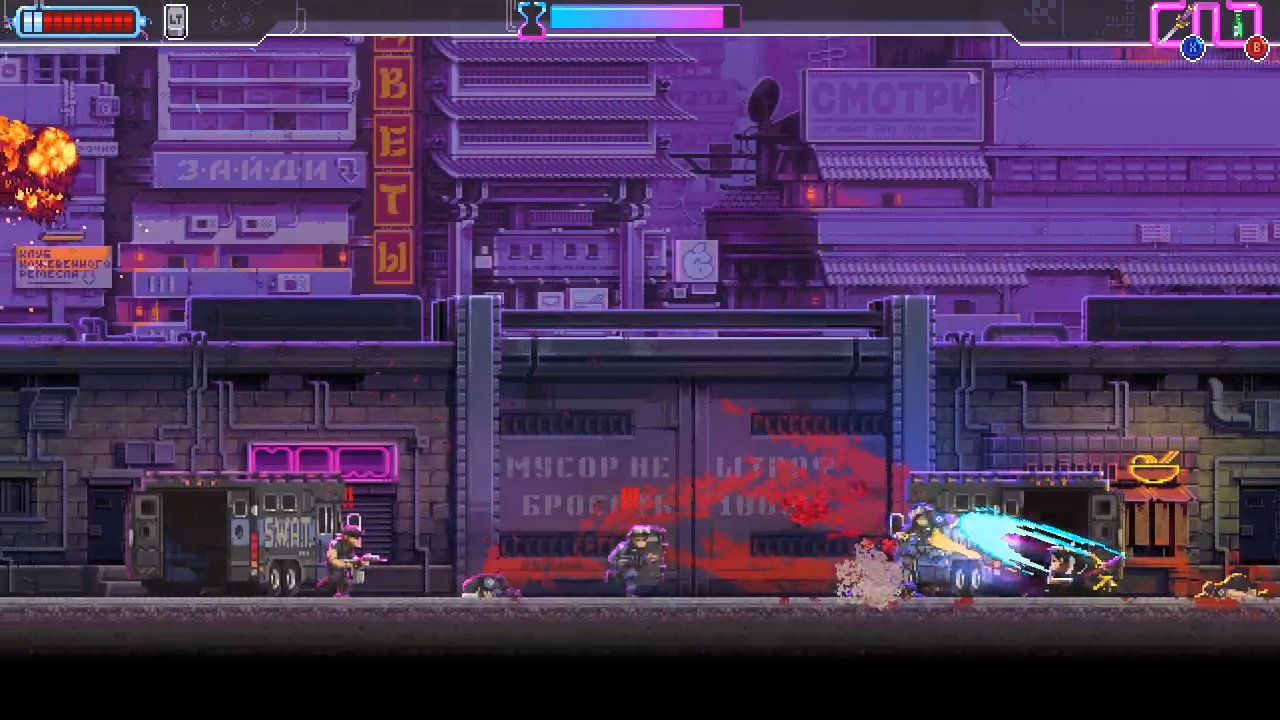
Smooth criminal
Katana Zero's protagonist is a gritty, urban samurai, or "guy with a sword in a bathrobe" as multiple gun-toting mobsters refer to him.
His toolkit of abilities is small enough to quickly develop muscle memory around but adaptable enough to make the combat encounters varied. He has a sword: good for stabbing enemies directly, deflecting bullets, or smashing down doors to kill anyone unfortunate enough to be standing near them. He can roll to avoid damage, important given that being hit by an enemy even once is instant death. He can pick up and throw helpfully placed objects like glass bottles or butcher knives. And he can slow time to a crawl at will for a limited duration thanks to an illicit drug he's getting from his maybe illicit psychologist.
It only takes me eight tries to pull it off the way I envisioned it.
Slowing time is Katana Zero's core ability, and turns what would otherwise be an unfair challenge into a tactical tango. But it's a scant resource that can seldom get me out of danger alone. I have to chain together slowed attacks with realtime ones or I'll wind up with an empty slow-mo tank while the bullets and fists are still flying.
In the back halls of a noisy nightclub, in pursuit of a drug-dealing DJ, I pause to watch four pompadoured gangsters hazing the newest member of the 'Skinny Rickys.' I'm badly outnumbered, but I can see three bottles and a butcher knife lying in a room at the top of the stairs. Four weapons, four crowbar-wielding Rickys. If I sprint up and throw the makeshift murder tools with four fast button presses, I can take them all down. So I do.
With their heads on the floor, I'm able to take out the guys with guns above them who are conveniently standing in the path of several deactivated lasers, the switch for which is on the wall beside me covered in Ricky guts. After frying those two, I jump and slash through the floorboards of another room, killing one mobster in the process and slowing time to deflect the bullet of the second one back in his face. That's the plan, anyway. It only takes me eight tries to pull it off the way I envisioned it.
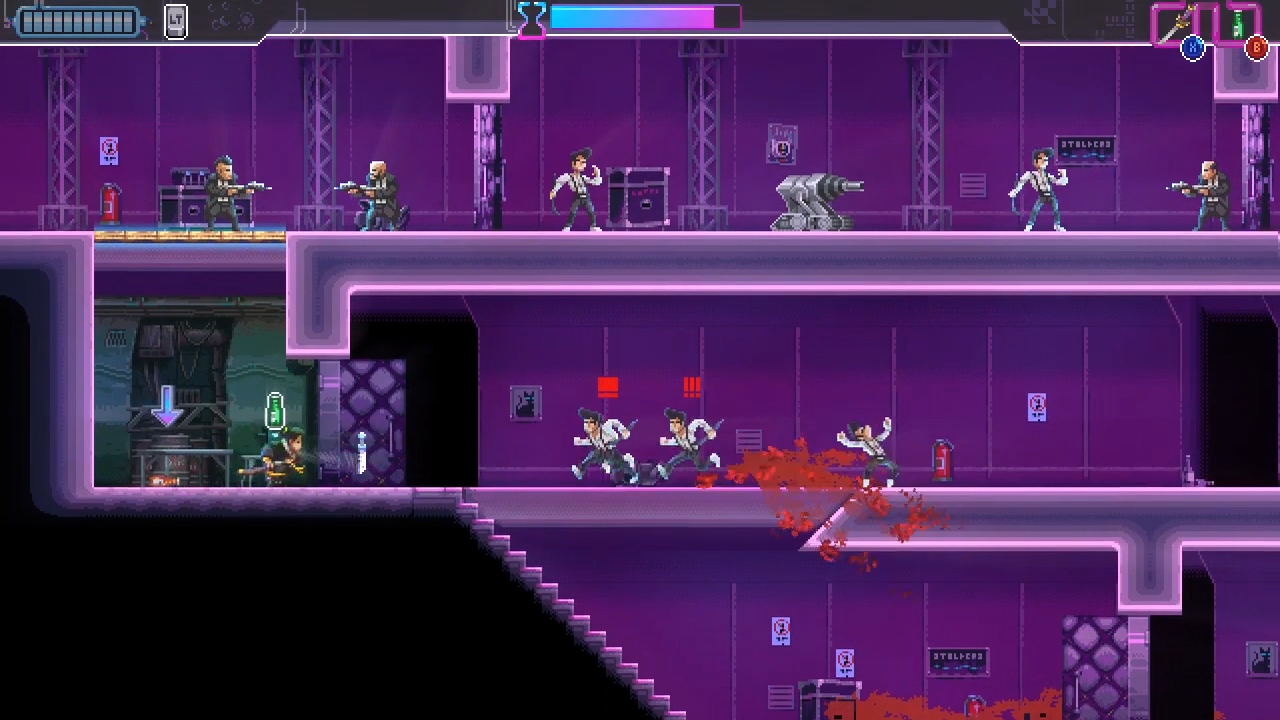
Although I'm expected to perform flawlessly, Katana Zero does the favor of separating its eleven levels into individual scenes that function like checkpoints. After clearing a stage and passing "go", I know I won't have to return. In most scenes, I can see the majority of the level from its outset, helping me to plan my moves or attempt alternate routes if one just isn't working how I envision. It keeps the frustration to a manageable level, knowing I stand to lose only around 20 seconds of effort with each death. Each individual scene is timed, but only one stage actually challenged my ability to clear it within the allotted time.
Katana Zero doesn't ask me to memorize and regurgitate combo chains that result in flashy custom moves. Instead, it requires that I actually learn the few abilities at my disposal and come up with my own combinations that, when played back at the end of each level in real-time, make me feel like more of a badass than any predefined finishing move could. Every completed encounter raises my heart rate and I'm rewarded with a screen full of carnage and pinky fingers sore from gripping my controller too tightly.
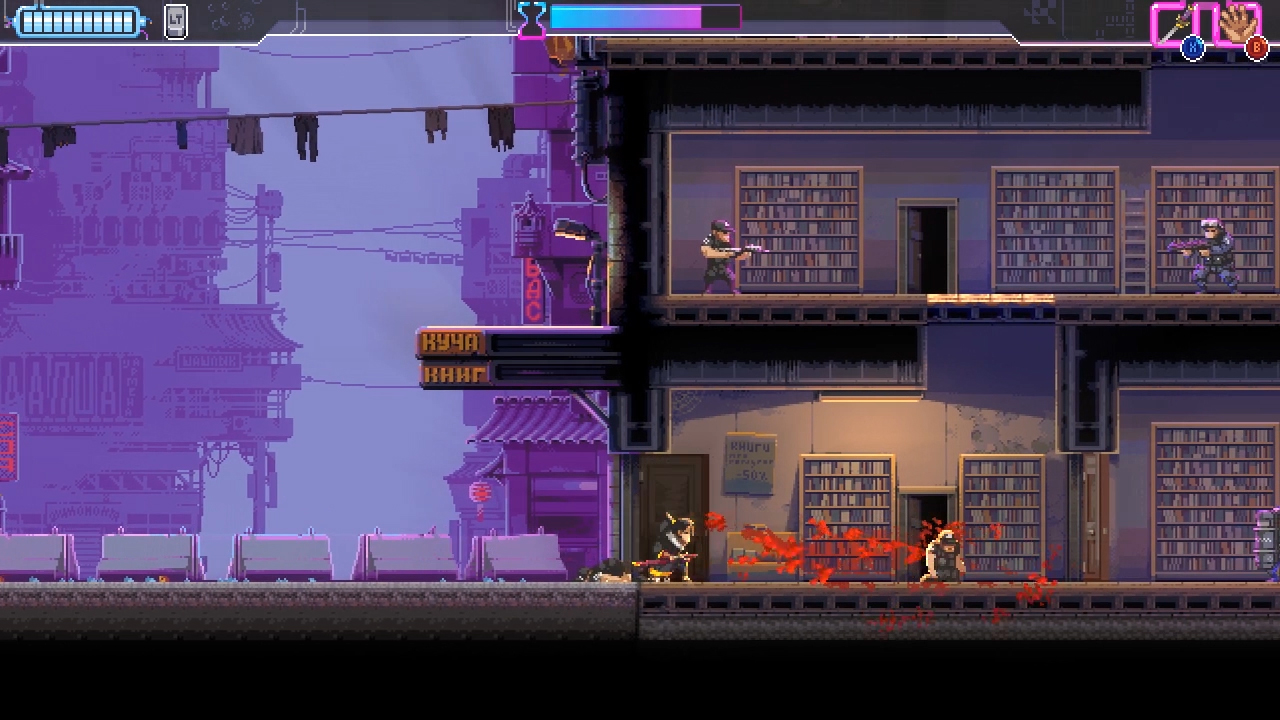
Attitude adjustment
Each combat section is preceded by a visit with my psychologist who dispenses both the drug that allows me to slow time and dossiers on my next target to kill. I'm sent to distribute death everywhere from the streets of Chinatown to a nightclub's dance floor. After my nightly mission is often another encounter, be it with bar regulars, a houseless man on the street, or the little girl in the apartment next door who's taken a shine to her cool samurai neighbor. Nightly interactions with other characters are a welcome break from the death treadmill. They work a bit like a Telltale game conversation in which I have a certain amount of time to decide on my character's response.
My favorite part: While another person is talking, I'll usually also have the option to interrupt them with a more aggressive or heated answer that prevents them from finishing their sentence. I have to forgo seeing the rest of the dialogue and don't have the ability to consider the aggressive choice as an equal alternative to the more thoughtful options.
More than once, I got fed up with my psychologist's placating attitude, feeling more and more like he was hiding something from me. I interrupted him several times in a row before storming out of his office. Thanks to some great visual effects: a bit of screenshake and the psychologist's dialogue bubble shattering like glass when I interrupt him, these choices really do pack emotional weight. Choosing them feels aggressive. I have to actively interrupt him.
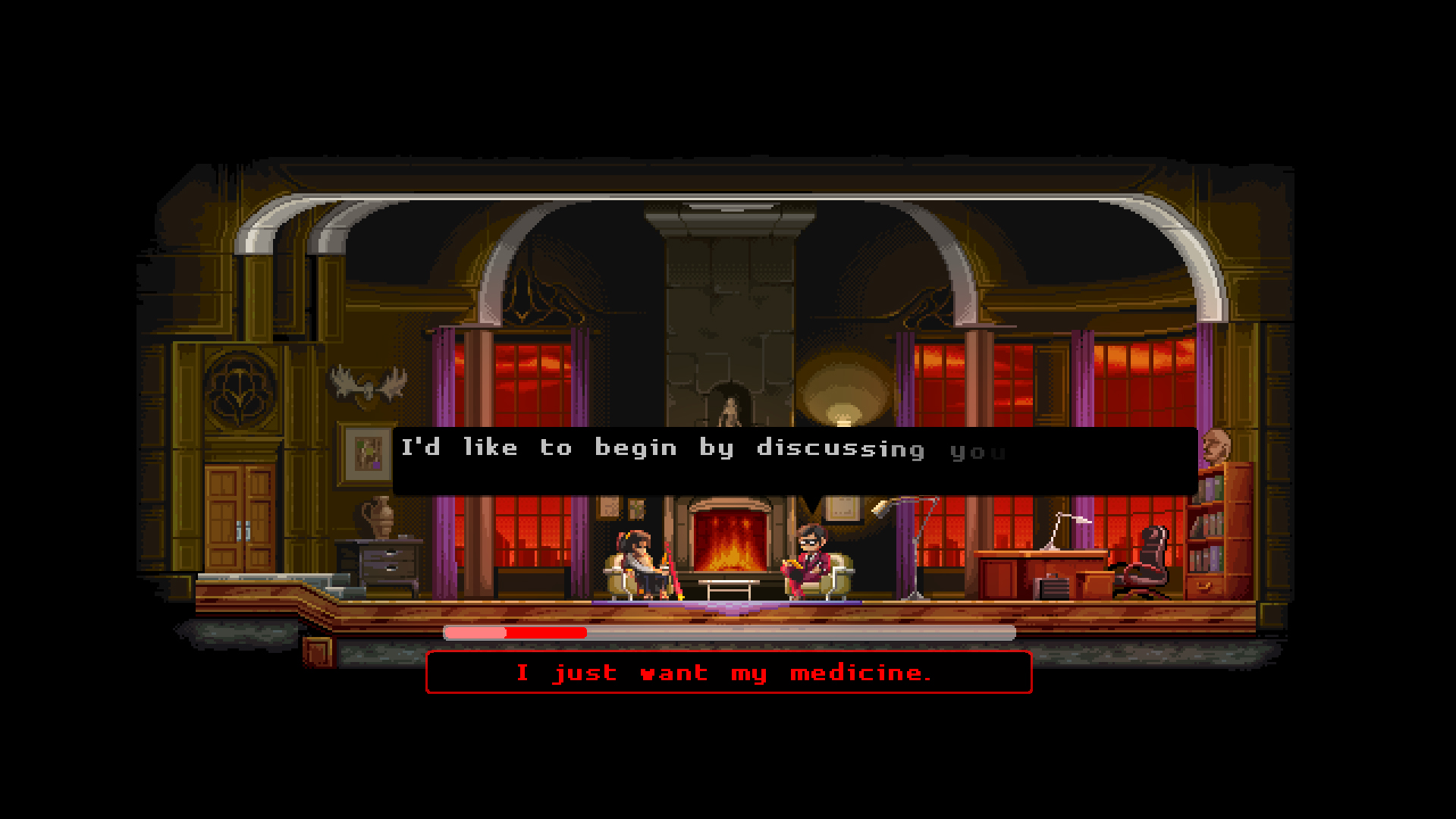
While the narrative isn't anything to pen a thesis on, it's backed up by a phenomenal electronic soundtrack.
Despite the great dialogue system, the narrative itself is pretty standard urban dystopian territory. The government is shady and corrupt. The protagonist lives in a ramshackle apartment. He's a victim of said shady government and his own unfortunate circumstances. I feel like I'm discouraged from judging the protagonist too harshly because he is sometimes (depending on my choices) nice to the little girl next door and also because he is quite sad and has drug-fueled nightmares. I've seen too many emotionally-damaged male anti-heroes to find his fate of any interest.
While the narrative isn't anything to pen a thesis on, it's backed up by a phenomenal electronic soundtrack with the flair of '80s sci-fi and 8-bit chiptunes. The majority of the music is grounded in Katana Zero's world through cassette tapes that the protagonist slaps into his portable player before each killing spree. When he presses play, the name of the song and artist appear briefly in the bottom left of the screen. It's an unexpected touch. I don't often hunt down the soundtrack for a game to listen after I'm through playing but for Katana Zero I have. It was impressive enough when punctuated by the shwings and blams of swords and guns but I'm enjoying it even more when I'm not dying as it plays.
Each of Katana Zero's eleven levels is a compact test of my ability to innovate with the combat tools it's given me, landing it among other expertly-crafted action puzzlers. Although its characters don't bring any new angles to the neon and noir cityscape, they don't detract from the expressive touches in the visual novel style dialogue system. As if that weren't enough to recommend it, an empty hub level unlocked after the final battle suggests there's more to the story coming soon.
Thoughtfully-designed levels and versatile combat abilities make Katana Zero worthy of a rewind despite cookie-cutter characters.

Lauren has been writing for PC Gamer since she went hunting for the cryptid Dark Souls fashion police in 2017. She accepted her role as Associate Editor in 2021, now serving as self-appointed chief cozy games and farmlife sim enjoyer. Her career originally began in game development and she remains fascinated by how games tick in the modding and speedrunning scenes. She likes long fantasy books, longer RPGs, can't stop playing co-op survival crafting games, and has spent a number of hours she refuses to count building houses in The Sims games for over 20 years.
